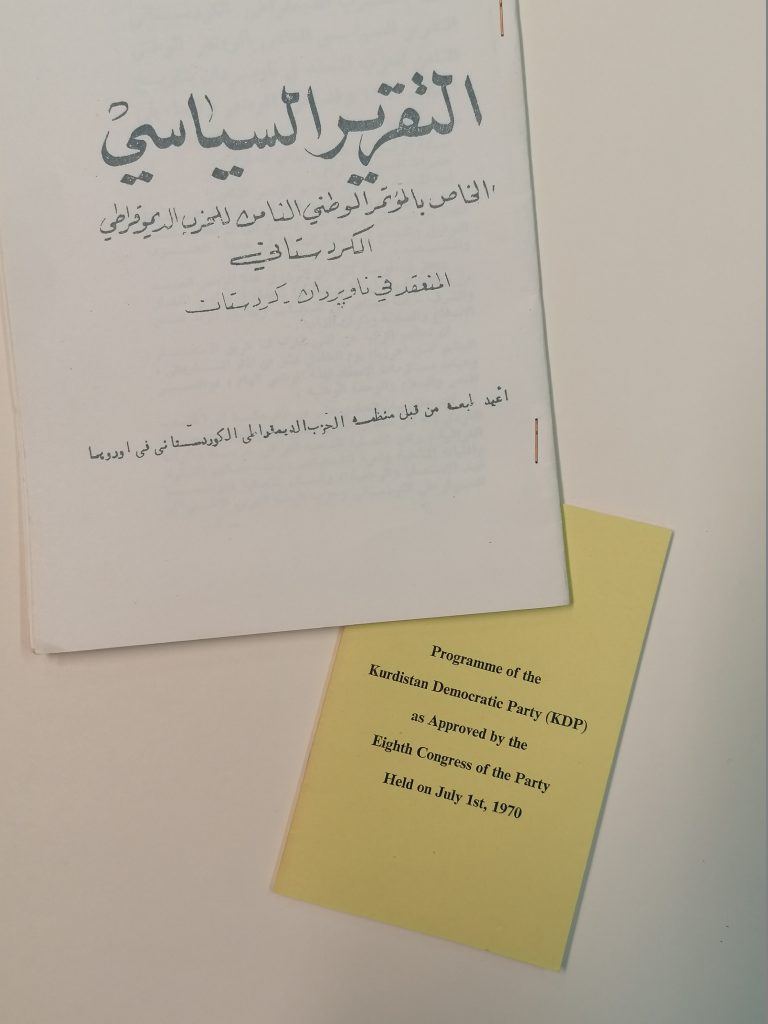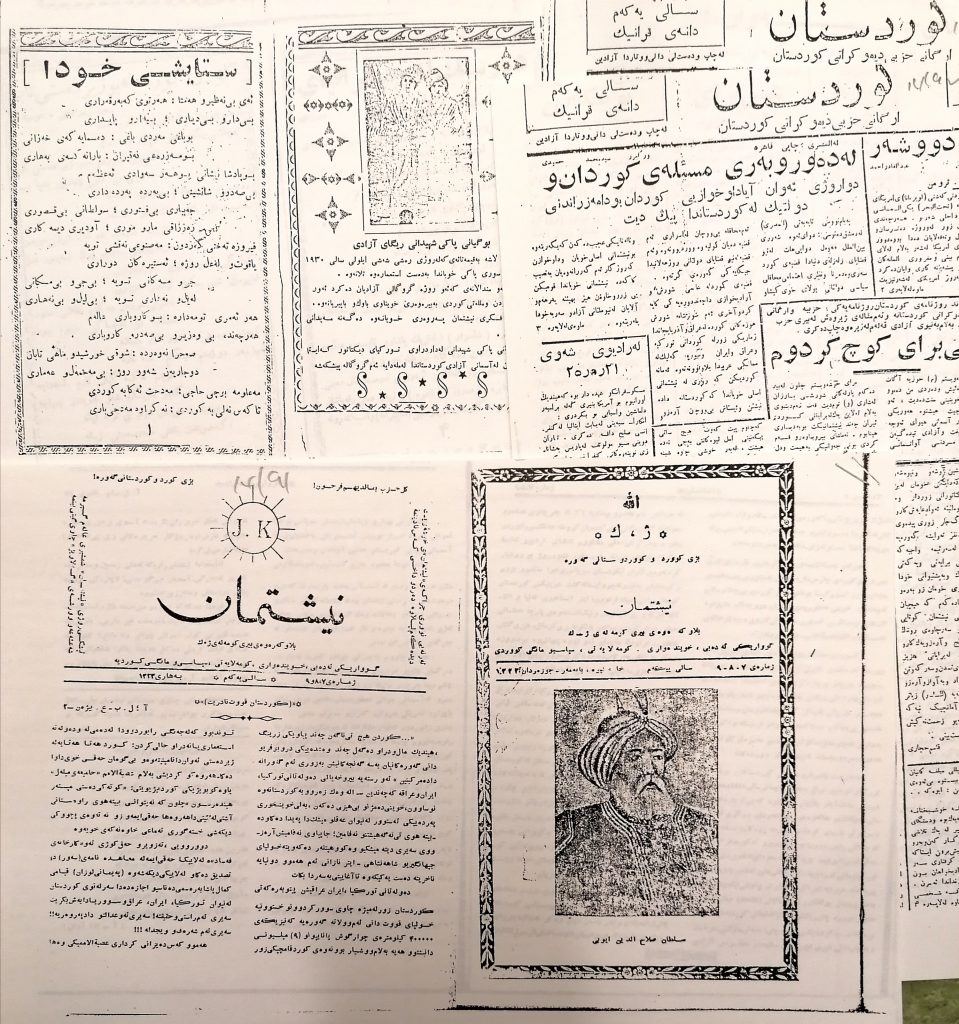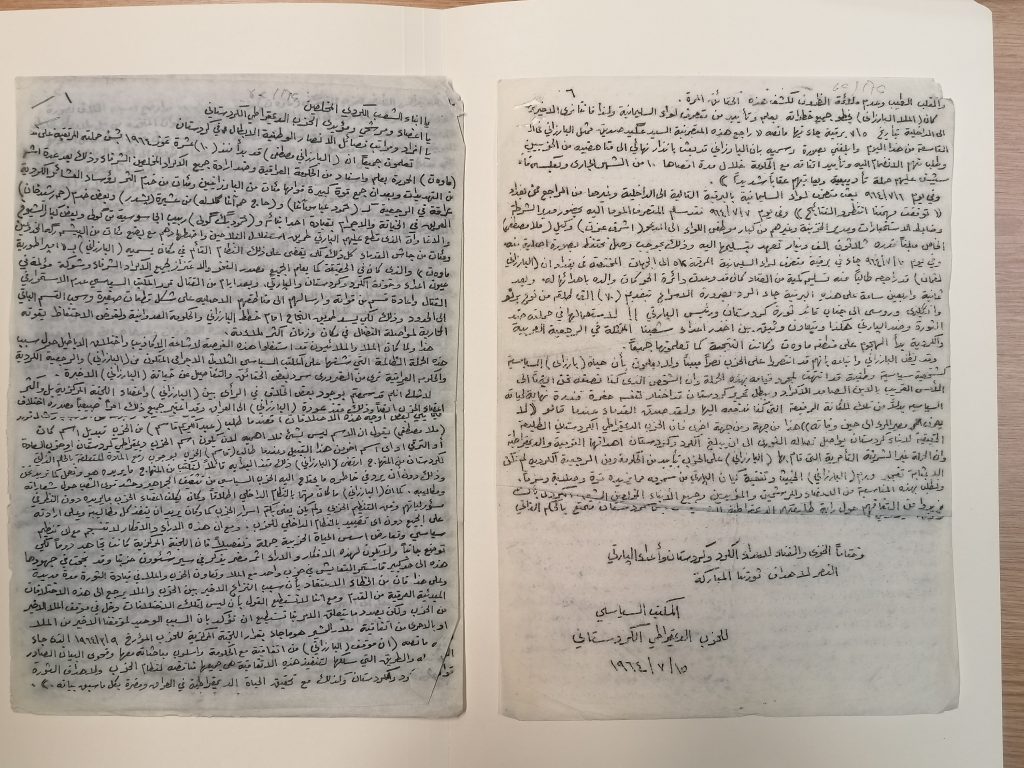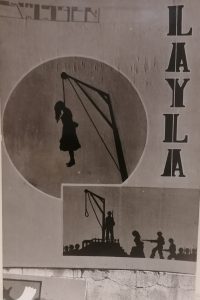Between 2007 and 2011 Omar Sheikhmous (born in Syria in 1942) generously donated a large collection of personal papers, books and periodicals to the University of Exeter that reflect and record a lifetime’s involvement in Kurdish political and academic activities. A prolific author, lecturer, conference-organiser and broadcaster, Sheikhmous has made an enormous contribution to Kurdish studies over the last four decades, but he has also been closely involved with political activism in his native Kurdistan. His archive offers a uniquely-detailed insiders’ perspective on the formation and activities of major Kurdish political bodies in Iraq, Syria and Iran – including the PUK, KDP, KDPI and Iraqi Communist Party – as well as numerous smaller groups, students’ organisations and exile associations. It also includes rare documents and personal correspondence with the likes of Jalal Talabani, Kemal Fuad, Fuad Masoum and other leading political and cultural figures. In the first of a series of blogposts, we will be looking at some highlights from the archive and exploring what they can teach us about the history of the Kurdish people.
Part 1: The Kurdistan Democratic Party from 1945 to 1975
In 1975 Omar Sheikhmous was a founding member of the Patriotic Union of Kurdistan (PUK), which has often had bitterly hostile relations with the Kurdistan Democratic Party (KDP), especially during the civil war of the mid-1990s. However, the archive contains numerous documents relating to the KDP’s early history, many of them rare and valuable in the insights they provide into the development of the Kurdish movement.

Material relating to the history of the Kurdistan Democratic Party (EUL MS 403/3/2/2)
Origins: the Kurdish Republic of Mahabad and the KDP in Iran
The Komalay Jiyanaway Kurdistan [Society for the Revival of Kurdistan], known as the ‘Komala J.K.’ for short, was founded in Mahabad in 1942 and quickly became the focus for the Kurdish nationalist movement, publishing a journal Niştiman [‘Motherland‘] and devising what became the Kurdish national flag – red, white and green. In 1945 Komala J.K. was disbanded to make way for a new political party that could operate in the open and replaced with The Kurdistan Democratic Party. Emboldened by the setting up of the autonomous Azerbaijan People’s Government in northern Iran, as well as the arrival of a large group of around 1,000 armed Iraqi Kurds and their families, headed by Mustafa Barzani, an independent republic was declared in January 1946, with Qāżi Moḥammed as its president and a parliament of thirteen ministers.declared Mahabad an independent Kurdish People’s Government.
For a short while the little republic flourished. Moḥammed wanted Mahabad to become the centre of a new revival of Kurdish culture, and a newspaper and political monthly – both called Kurdistan – were published in the town, as well as two literary journals, Havar and Hilal. Textbooks were also printed in the Kurdish language, which was used to teach children in the classrooms.
Throughout this time the republic had relied upon support from Soviet Russia, and when this was withdrawn in the autumn of 1946 as part of an agreement with the government in Tehran, the end came swiftly. Barzani and his tribesmen left and Iranian forces swept into Mahabad in December. Qāżi Moḥammed was arrested and hanged with his brothers Seif and Sadr at dawn on 31 March 1947.
We have a number of interesting items relating to Mahabad in the Sheikhmous archive, including copies of some of the Kurdish periodicals and newspapers that were published during the Republic. These include the first three issues of the Persian-language periodical Gir wa Gali Mindalani Kurd (1946), an issue of the periodical Niştiman (1945) and five issues from 1946 of the newspaper Kurdistan , which like Niştiman was written in Sorani Kurdish. There are also some later materials, such as an undated French leaflet commemorating the Republic that includes a rather gruesome photograph of the execution of Qāżi Moḥammed and his co-leaders. A letter to Omar Sheikhmous from Qāżi Moḥammed’s only son Ali, written in 1991, is also in the archive.

Copies of the newspaper ‘Kurdistan’, printed and published by the KDPI in Mahabad in 1946. EUL MS 403/3/2/1
The KDP in Iraq
Although the tragic end of the Republic effectively crushed the KDP in Iran, Barzani had managed to establish the party across the border in Iraq, where the new KDP of Iraq held its first congress in Baghdad on 16 August 1946. Following the fall of Mahabad, Barzani fled to the USSR and did not return until 1958: his place was taken by Ibrahim Ahmad, who had been the head of the Suleymania branch of Komala JK. A talented writer and political leader, Ahmad became chairman of the KDP in Iraq at the second party congress in 1951. He would later become the father of Jalal Talabani, co-founder of the PUK, future Prime Minister of Iraq and a close friend of Omar Sheikhmous: as a consequence of which we have a great deal of correspondence and other documents written by Talabani in the archive.
Over the next ten to fifteen years, the KDP continued to grow in Iraq, often working closely with the Iraqi Communist Party. On 14 July 1958 General Abd al-Karim Qasim led a coup in Iraq that toppled the Hashemite monarchy which had ruled the country since 1920. This was done with the support of the KDP, and under the new regime Barzani was able to return from exile. There was, however, tension between him and Ibrahim Ahmad, whose socialist leanings were not to Barzani’s likings. Good relations with the Iraqi government did not last either, as Qasim broke his promise of granting Kurdish autonomy and instead stirred up trouble among the Kurdish tribes. On 11 September 1961 Barzani led the Kurds in taking up arms against the Iraqi forces, beginning a war that would last until 1975. During this time Qasim was deposed and killed by another coup led by the Ba’ath party; further infighting and coups followed until the Ba’athists consolidated their power in 1968.

A handwritten open letter from the KDP (15 July 1964) – EUL MS 403/3/2/1
We have a number of documents from this period, including a cyclostyled handwritten proclamation to the Kurdish people by the KDP (12 May 1962), a six-page handwritten open letter from the KDP (15 July 1964 – illustrated above) and a KDP press release signed by Mustafa Barzani (10 February 1965).
The KDP and the Ba’ath Party, 1968-75
The Ba’ath Party never had any real desire to promote Kurdish autonomy, but the manifesto drawn up in March 1970 – negotiated with Saddam Hussein – seemed to meet most of Barzani’s demands, recognising Kurdish as an official language and inviting members of the KDP to join a government taskforce for implementing the manifesto. Suspicion remained on both sides however, there was several assassination attempts on Barzani that were likely backed by the Iraqi government, and neither party could agree over the status of Kirkuk. In the background too, Barzani had moved away from Soviet Russia to align his party with the US and Iran, while Baghdad and Moscow had grown closer. In March 1974 Saddam Hussein imposed a revised version of the autonomy manifesto and gave Barzani two weeks to respond. His rejection of the offer launched a full-scale conflict between the Kurdish peshmerga and the Iraqi forces, but sadly Barzani would realise too late that the support offered by the Shah and the American authorities was a means to an end rather than a loyal commitment.

Poster by unknown artist commemorating the execution of KDP member Layla Qasim, who was hanged in Baghdad in April 1974. EUL MS 403/7/7
Not for the first time, the Kurds would find themselves exploited by the west and then abandoned in their time of need. The US support failed to materialise, and in March 1975 the Iraqi government persuaded Iran to withdraw their support of the Kurds in exchange for access to the vital Shatt al-Arab waterway connecting the Iranian port of Abadan to the Persian Gulf. The Kurdish uprising collapsed overnight and Barzani, with around 100,000 of his followers, crossed the border to take refuge in Iran. He died four years later.
This was a confusing and complicated period of Kurdish history and one of the great strengths of the Sheikhmous archive is the number of original documents that provide insights into what the different parties were doing and saying at this time, both in private and in public. In addition to correspondence between KDP members, there are press releases, KDP newspapers and publications, open letters to the Iraqi public and communications to the Kurdish community in exile.
In the next blogpost in the series, we will look at the founding of the Patriotic Union of Kurdistan (PUK) in June 1975 and the role played by Omar Sheikhmous in the party’s development and activities….